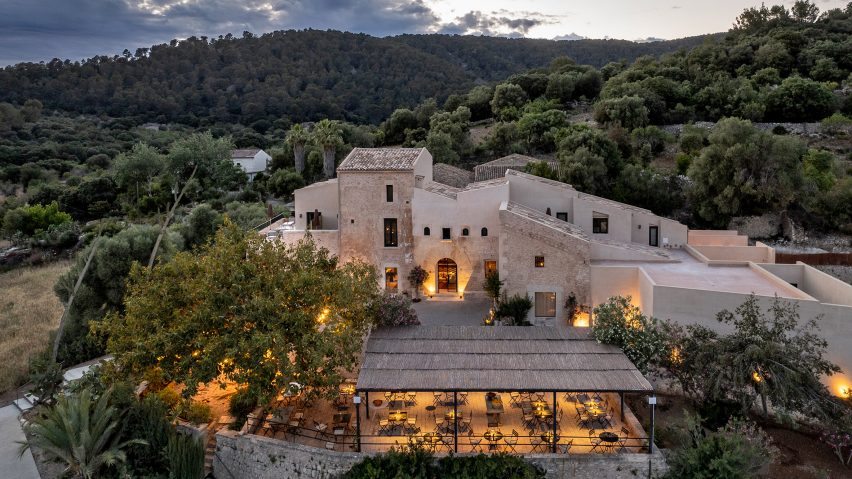A roughly-hewn stone trough and a traditional mill for pressing olive oil were repurposed by interior designer Pilar García-Nieto within this farmhouse-turned-hotel near Mallorca's Serra de Tramuntana mountain range.
The Lodge is the latest boutique hotel from Único Hotels, tucked away inside a 157-hectare estate filled with centenarian almond and olive trees, lavender fields and 20 kilometres of hiking trails.
All of the hotel's public spaces and six of its guest rooms are housed inside a converted 16th-century farmhouse, which was renovated from the ground up.
"To be able to enjoy a 500-year-old house is a privilege," García-Nieto told Dezeen. "Many generations have gathered behind those walls. It is this spirit of a family home that we have tried to preserve."
A further 18 suites were dotted across the grounds, set in newly constructed cabins modelled on the few remaining walls of the farm's outbuildings.
Although The Lodge's interiors are largely clean and minimal, traces of the estate's agricultural past were left to peek out everywhere throughout the hotel.
The farm's original tafona – a stone mill used for making olive oil – now stands in the reception in front of a wall of fridges filled with wine from local vineyards.
"Aesthetically it is unbeatable," García-Nieto said. "Either you are lucky enough to have one or it is impossible to replicate it."
"That is why it was important for us to preserve the one we have, and to give it the great protagonism it deserves."
Some of the building's original stone walls were left exposed on the interior while the huge trough sink that stood in the former kitchen now acts as a water fountain near the entrance.
These period details were complemented with a selection of new and vintage pieces, sourced from second-hand shops in the nearby village of Consell and further afield.
Among them is an antique French tapestry that was suspended above a modern console table at the entrance. Nearby, in the hotel's restaurant Singular, contemporary art hangs next to French bronze wall sconces from the Napoleonic period.
Here, guests can eat in a high-ceilinged dining room or on a leafy terrace with clean-lined metal garden furniture, overlooking the hotel's glistening infinity pool and the surrounding coppices.
The rugged nature of the nearby Tramuntana mountains informed The Lodge's interior in the form of its earthy colour and material palette.
Located right off the reception, the lounge combines blackened timber tables with rattan stools. And an original mortar found in the farmhouse is displayed inside a towering antique shelving unit from France.
At the centre of the room, a row of sandy beige sofas backs onto a biombo screen made from stacked ceramic modules.
"It was a lot of fun to assemble it," García-Nieto said. "It was like playing Tetris between five people."
Ceramics also feature heavily throughout the rest of The Lodge, with many left over from the farmhouse and others made by local craftsmen.
Among them are the decorative vases found in each guest room, which are handmade from black clay by a master potter.
"We love what pottery represents – an element so closely linked to the earth that man has used since ancient times to turn it into essential pieces for his way of life," García-Nieto said.
The 18 suites that aren't set inside the main farmhouse can be accessed via a short ride on one of the hotel's bicycles or golf buggies.
Modelled on the renovated farmhouse with its irregular gables, each of these cabins features a dramatic single-pitch roof with the ceiling beams left exposed on the inside.
The same texture-heavy but colour-sparse palette from the main building is also carried over into the suites.
Interest is provided by combining different kinds of timber, from the pale, raw-edged coat stands to the Japanese-style charred-wood stools.
All of the suites have a private Mallorcan patio to provide a greater connection to the surrounding farmland, which the hotel is using to grow produce for the Singular restaurant and for Finca Serena – Único Hotels' other outpost on the island.
The Tramuntana mountain range occupies roughly 30 per cent of Mallorca's terrain and is designated as a UNESCO World Heritage Site due to its rich agricultural history.
Much of the surrounding area is still used for farming today – for example by the Son Juliana wine company, which has a solar-powered winery at the foot of the mountain range that is made from local sandstone with wicker sunshades and cork-insulated roofs.
Increasingly, tourists are also being drawn away from Mallorca's pristine beaches and towards Tramuntana's dramatic landscapes, with the opening of several new hotels including The Olive Houses – a group of off-grid guesthouses, where craggy boulders jut through the walls and into the interiors.
The photography is by Montse Garriga.

